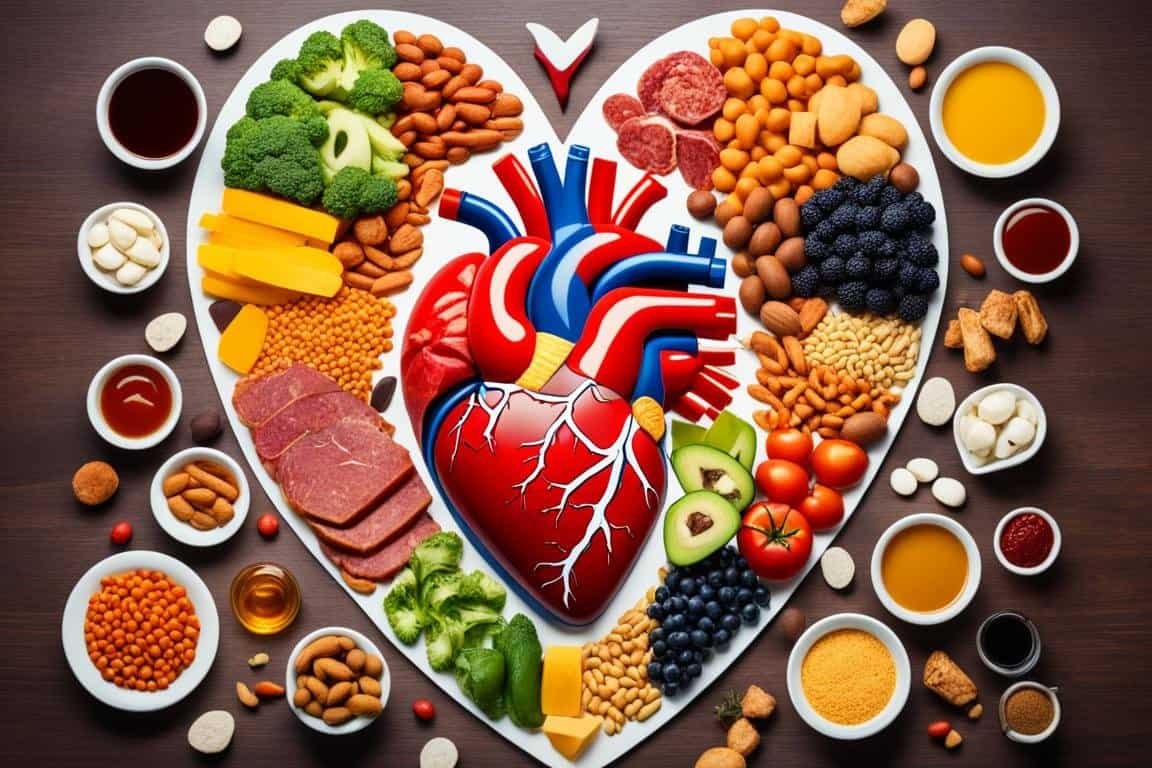Should I be concerned if my total cholesterol is high? High total cholesterol levels can be a cause for concern when it comes to your overall health. Cholesterol is a waxy substance found in your blood that is necessary for building healthy cells. However, when levels of cholesterol become too high, it can increase the risk of heart disease and other health complications.
Managing high cholesterol is essential for maintaining good heart health. Through a combination of lifestyle changes and, if necessary, medical treatment, you can lower your cholesterol levels and reduce the associated health risks.
Key Takeaways:
- High total cholesterol can increase the risk of heart disease.
- Unhealthy lifestyle choices can contribute to high cholesterol levels.
- Regular cholesterol screenings are important, especially for individuals with risk factors.
- Lifestyle changes, such as healthy diet and exercise, can help manage high cholesterol.
- Medications may be prescribed to lower cholesterol levels if lifestyle changes alone are insufficient.
Understanding Cholesterol and its Effects on the Body
Cholesterol is carried through the blood by lipoproteins, which include low-density lipoprotein (LDL) and high-density lipoprotein (HDL). LDL cholesterol, also known as “bad” cholesterol, can build up in the arteries and increase the risk of heart disease. HDL cholesterol, or “good” cholesterol, helps remove excess cholesterol from the bloodstream. Triglycerides, another type of fat in the blood, can also contribute to high cholesterol levels. Factors such as diet, exercise, genetics, and certain medical conditions can influence cholesterol levels.
LDL cholesterol: LDL cholesterol is considered the “bad” cholesterol because it can deposit cholesterol in the walls of arteries, leading to the formation of plaque. This buildup of plaque can narrow the arteries and increase the risk of heart disease.
HDL cholesterol: HDL cholesterol is often referred to as the “good” cholesterol because it carries cholesterol from the bloodstream back to the liver, where it can be removed from the body. Higher levels of HDL cholesterol are associated with a lower risk of heart disease.
Lipoproteins: Lipoproteins are particles that transport cholesterol and triglycerides through the blood. LDL and HDL are two types of lipoproteins that play essential roles in cholesterol metabolism.
| Lipoprotein | Function |
|---|---|
| LDL cholesterol | Transports cholesterol from the liver to the body’s cells |
| HDL cholesterol | Transports excess cholesterol from the body’s cells to the liver for disposal |
| Triglycerides | Store excess calories and provide energy |
High levels of LDL cholesterol and triglycerides, along with low levels of HDL cholesterol, can increase the risk of developing heart disease and other cardiovascular conditions. It is crucial to maintain a healthy balance of LDL and HDL cholesterol in the body.
There are several risk factors that can contribute to high cholesterol levels, including unhealthy dietary choices, lack of physical activity, genetics, and certain medical conditions. Understanding cholesterol and its effects on the body can help individuals make informed decisions about their lifestyle and take necessary steps to manage their cholesterol levels.

Risk Factors and Complications of High Cholesterol
When it comes to high cholesterol levels, several risk factors come into play. These factors can contribute to the development of high cholesterol and its associated complications. By understanding these risk factors, you can take steps to lower your cholesterol levels and improve your heart health.
Poor Diet and Lifestyle Choices
A poor diet high in saturated and trans fats can significantly impact your cholesterol levels. Consuming unhealthy fats found in fried foods, processed snacks, and fatty meats can raise your cholesterol levels and increase the risk of atherosclerosis, the buildup of plaque in the arteries. To lower cholesterol, prioritize healthy food choices, such as fruits, vegetables, whole grains, and lean proteins.
Additionally, a sedentary lifestyle and lack of physical activity can contribute to high cholesterol levels. Regular exercise not only helps maintain a healthy weight but also improves cholesterol levels by increasing the levels of high-density lipoprotein (HDL) cholesterol, known as the “good” cholesterol. Aim for at least 150 minutes of moderate-intensity exercise per week to lower cholesterol.
Harmful Habits
Smoking and excessive alcohol consumption are two harmful habits that can negatively impact cholesterol levels. Smoking damages blood vessels and lowers HDL cholesterol levels, while heavy alcohol consumption can increase triglyceride levels and raise blood pressure. Quitting smoking and moderating alcohol intake can significantly improve cholesterol levels and reduce the risk of cardiovascular complications.
The Role of Age
As we age, our cholesterol levels tend to increase naturally. This is because our bodies produce less LDL cholesterol receptors, resulting in higher LDL cholesterol levels. Age-related changes in hormone levels and metabolism can also influence cholesterol levels. It is crucial to monitor your cholesterol levels regularly, especially as you get older, to catch any abnormalities early on.
Complications of High Cholesterol
High cholesterol can have severe complications if left untreated. Atherosclerosis, the buildup of plaque in the arteries, can restrict blood flow and lead to chest pain known as angina. In more severe cases, atherosclerosis can cause a heart attack if the blood flow to the heart is completely blocked or a stroke if the brain’s blood supply is compromised.
Individuals with high cholesterol are also at increased risk for other health conditions, including obesity, diabetes, and high blood pressure. Managing cholesterol levels is crucial for overall health and reducing the risk of these associated conditions.

By addressing risk factors such as poor diet, obesity, lack of exercise, smoking, alcohol consumption, and age-related changes, you can effectively manage your cholesterol levels and lower your risk of complications. It is essential to adopt a healthy lifestyle, make informed choices, and work closely with your healthcare provider to develop an individualized plan to improve your heart health.
Prevention and Lifestyle Changes for High Cholesterol
To prevent and manage high cholesterol, it is important to make certain lifestyle changes. By incorporating these changes into your daily routine, you can improve your cholesterol levels and protect your heart health. Let’s explore some key strategies:
1. Adopt a low-salt diet:
Focus on consuming foods that are low in salt and sodium. Emphasize the intake of fresh fruits, vegetables, and whole grains, which are packed with essential nutrients and fiber. These food choices can help lower cholesterol levels and reduce the risk of heart disease. Avoid processed and packaged foods, as they often contain high levels of sodium.
2. Include good fats in your diet:
Replace unhealthy saturated fats with good fats, such as those found in avocados, nuts, and olive oil. Good fats can help improve cholesterol levels and protect against heart disease. Incorporate these healthy fats into your meals and snacks to benefit your overall health.
3. Maintain a healthy weight:
Proper weight management plays a crucial role in controlling cholesterol levels. Engage in regular physical activity, such as brisk walking, jogging, cycling, or swimming, to maintain a healthy weight and improve your cardiovascular health. Aim for a minimum of 30 minutes of moderate-intensity exercise at least five days a week.
4. Quit smoking:
Smoking damages blood vessels and lowers the levels of good cholesterol (HDL). Quitting smoking is a vital step toward improving not only your cholesterol levels but also your overall health. Seek support from friends, family, or healthcare professionals to successfully quit smoking and reduce your risk of heart disease.
5. Manage stress:
Chronic stress can negatively impact cholesterol levels and contribute to heart disease. Practice stress management techniques such as deep breathing exercises, meditation, yoga, or engaging in hobbies that bring you joy. Finding healthy ways to manage stress can have a positive impact on your cholesterol levels and overall well-being.
6. Moderate alcohol consumption:
If you consume alcohol, do so in moderation. Limit your intake to one drink per day for women and two drinks per day for men. Excessive alcohol consumption can raise cholesterol levels and increase the risk of heart disease. Be mindful of your alcohol consumption and make responsible choices to protect your heart health.
Implementing these lifestyle changes can significantly contribute to maintaining healthy cholesterol levels and reducing the risks associated with high cholesterol. Remember, consistency and commitment are key. Take control of your cholesterol levels and enjoy a healthier, more vibrant life.
Treatment Options for High Cholesterol
In some cases, lifestyle changes alone may not be sufficient to lower high cholesterol levels, and medications may be prescribed. One common medication used to treat high cholesterol is statins. Statins work by reducing the liver’s production of cholesterol, thereby lowering overall cholesterol levels.
Other medications, such as PCSK9 inhibitors and bile acid sequestrants, may also be used in combination with lifestyle modifications to manage high cholesterol. PCSK9 inhibitors work by helping the liver remove LDL cholesterol from the bloodstream, while bile acid sequestrants bind to bile acids in the intestines, preventing their reabsorption and promoting the elimination of cholesterol.
It is important to discuss the potential side effects and benefits of these medications with a healthcare provider. Some common side effects of cholesterol-lowering drugs include muscle pain, liver damage (rare), and digestive issues. Your doctor will carefully consider your individual circumstances and medical history before recommending the most suitable medication for you.
| Medication | Mechanism of Action | Common Side Effects |
|---|---|---|
| Statins | Reduce liver’s cholesterol production | Muscle pain, liver damage (rare), digestive issues |
| PCSK9 inhibitors | Help liver remove LDL cholesterol from the bloodstream | Allergic reactions, cold-like symptoms, flu-like symptoms |
| Bile acid sequestrants | Bind to bile acids in the intestines, promoting elimination of cholesterol | Constipation, bloating, gas, stomach upset |
Conclusion
High cholesterol levels can pose significant health risks and increase the chances of developing heart disease or experiencing heart attacks and strokes. It is essential to prioritize your heart health and take proactive steps to manage your cholesterol levels effectively.
By adopting a healthy lifestyle that includes a balanced diet, regular exercise, and weight management, you can reduce your cholesterol levels and improve your overall heart health. A diet rich in fruits, vegetables, whole grains, and good fats can help lower cholesterol levels. Incorporating regular physical activity into your routine not only contributes to weight management but also helps increase your HDL (good) cholesterol levels.
It is crucial to have regular cholesterol screenings and work closely with a healthcare provider to develop a personalized plan for managing high cholesterol. Your healthcare provider can guide you in making appropriate lifestyle modifications and, if necessary, prescribe medications to help lower your cholesterol levels safely. With the right combination of lifestyle changes and, if needed, medication, you can effectively manage your cholesterol levels and reduce the associated risks to your heart health.

